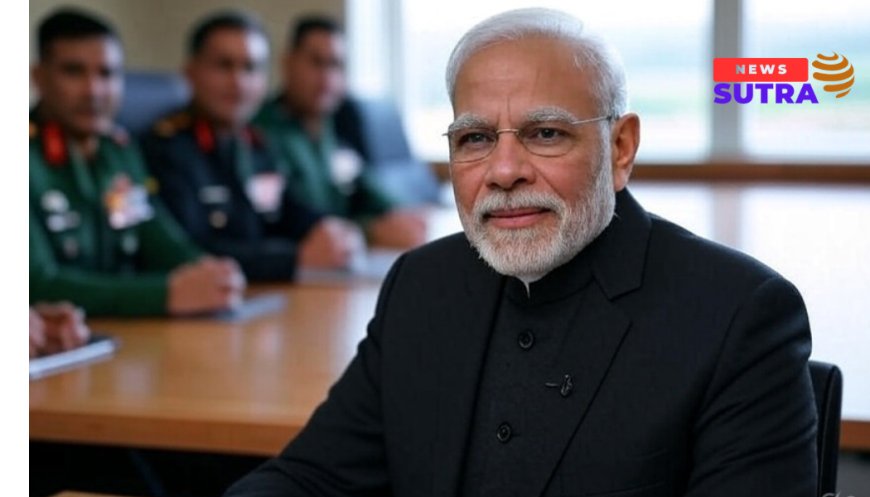PM Modi to Chair Crucial Council of Ministers' Meeting Following Strategic 'Operation Sindoor'
Prime Minister Narendra Modi is set to lead a high-level Council of Ministers' meeting post-'Operation Sindoor'. Explore the operation's implications, political strategies, and India's evolving national security agenda.

In a politically and strategically significant move, Prime Minister Narendra Modi will chair a Council of Ministers' meeting in New Delhi following the successful completion of Operation Sindoor—a covert mission widely seen as a turning point in India’s national security posture. Scheduled just days after the operation’s execution, the meeting will bring together top cabinet members, key bureaucrats, and senior intelligence officials to assess the broader implications of the mission and outline the government's roadmap ahead.
What is Operation Sindoor?
While the central government has maintained tight secrecy around Operation Sindoor, credible sources indicate that it involved a high-level counter-intelligence initiative conducted across border-sensitive zones. The operation reportedly targeted infiltration networks and disrupted logistics that could have threatened national security in the run-up to the upcoming monsoon session of Parliament.
According to a report by Hindustan Times, Operation Sindoor may have led to the identification and neutralization of sleeper cells operating in key urban hubs. Though official confirmation is pending, multiple sources suggest that the Ministry of Home Affairs and National Security Advisor Ajit Doval were directly involved in operational planning and execution.
Strategic Timing of the Council Meeting
The timing of the Council of Ministers’ meeting, scheduled for later this week, is noteworthy. It not only signals the culmination of a complex internal security strategy but also serves as a platform for PM Modi to align his team on policy goals post-operation. Analysts believe that Modi will use the opportunity to reinforce his zero-tolerance approach to terrorism, while also discussing implications for the country’s foreign policy and defense alignment.
Dr. Sanjeev Srivastava, a senior fellow at Observer Research Foundation, noted that:
“The Prime Minister's decision to chair the meeting personally underscores the weight of Operation Sindoor in the national security landscape. It's a message to both domestic political actors and international stakeholders.”
Topics Likely to be Discussed
The agenda for the meeting is expected to include:
-
Post-operation intelligence assessments
-
Strengthening inter-agency coordination
-
Border surveillance technology upgrades
-
Policy framing ahead of the Monsoon Session
-
Communications strategy and media briefing guidelines
Additionally, several ministers are expected to present updated reports from their departments on the readiness of key infrastructure projects and governance schemes, particularly in light of the volatile geopolitical climate.
Political Implications Ahead of 2025 Assembly Elections
The Council meeting also holds deep political significance as it sets the tone for BJP’s positioning ahead of key 2025 state elections. Operation Sindoor has already been touted in political circles as a "decisive move" that reflects Modi’s leadership style—a mix of stealth diplomacy and hard power.
According to PRS Legislative Research, the upcoming legislative calendar includes several bills with national security implications. Ensuring that the Council of Ministers is in lockstep on these matters could be critical for parliamentary outcomes.
International Observations and Strategic Reactions
Foreign policy think tanks have also started to weigh in. The Carnegie India institute suggested that India's approach under Operation Sindoor may serve as a "template for pre-emptive intelligence operations in democracies facing hybrid threats."
Additionally, India's immediate neighbors and global powers are likely to interpret this move as a recalibration of India’s security doctrine. A closed-door diplomatic briefing with strategic partners including the U.S., Israel, and France is rumored to follow the internal Council discussions.
Conclusion
The upcoming Council of Ministers' meeting, chaired by Prime Minister Modi, is more than a routine policy gathering. It marks a critical inflection point in India's domestic and international strategy post-Operation Sindoor. With heightened expectations and intensified political scrutiny, the meeting could very well shape the trajectory of India’s governance and security landscape for years to come.
Stay updated with real-time developments via the Press Information Bureau and LiveMint.



















































